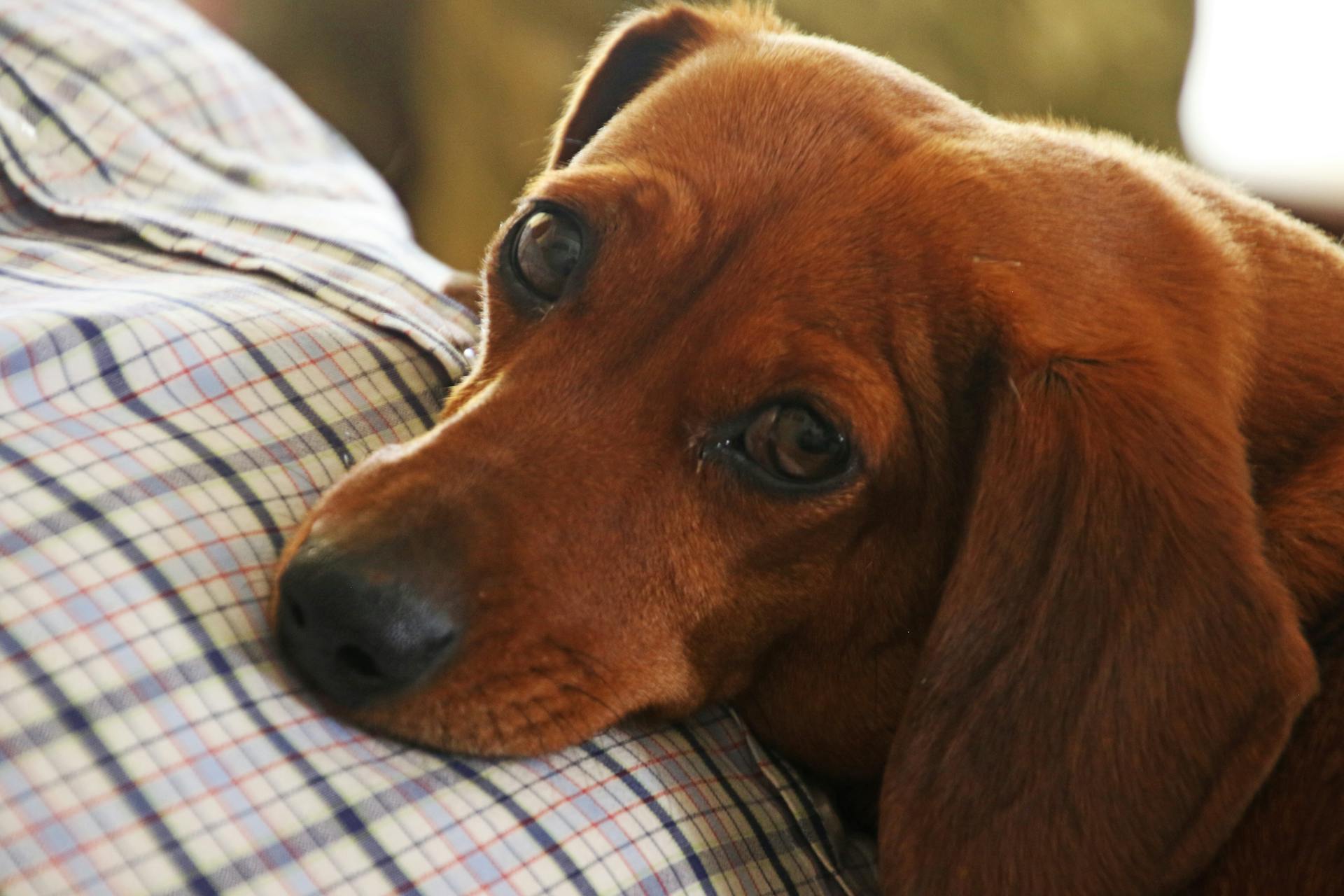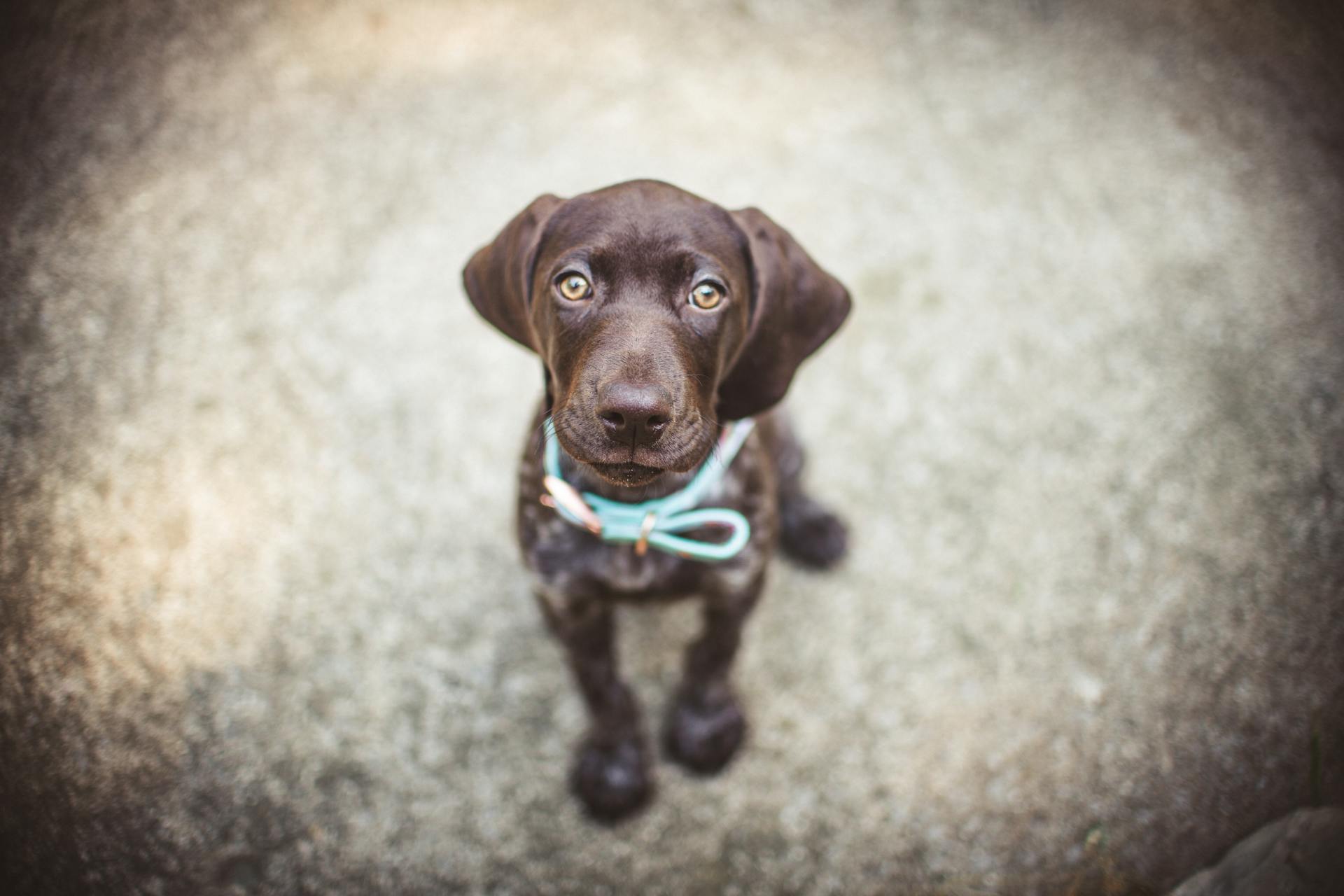
Dachshunds are known for their loyal temperament, making them great companions for many families. They form strong bonds with their owners and can become protective of them.
Their loyalty is rooted in their history as hunting dogs, bred to work closely with their human partners. This close relationship has been passed down through generations, resulting in a dog that is deeply devoted to its family.
Despite their small size, Dachshunds are fearless and will stand up for themselves and their loved ones if necessary.
Breed Overview
Dachshunds have a unique body shape with a long, low trunk and short legs, making them well-suited for digging and following prey underground.
Their muscular forequarters allow them to move efficiently and agilely, which is essential for hunting and navigating tight spaces.
Dachshunds date back to the 15th century, when they were developed in Germany as a cross between terriers and hounds.
They were originally bred to hunt badgers, wild boar, foxes, and rabbits, and their size varied depending on the type of hunting they were used for.
Dogs weighing between 30 and 35 pounds were used to hunt wild boar, while those between 16 and 22 pounds were used to hunt smaller game like foxes and rabbits.
Dachshunds were imported to the United States in the late 1800s and quickly gained popularity as pets, with famous owners like Pablo Picasso and Andy Warhol.
Recommended read: What Did Dachshunds Hunt
Temperament and Behavior
Dachshunds are determined and courageous little dogs with intelligent, expressive eyes. They can be prone to barking at strangers, squirrels, and other triggers.
Dachshunds often become attached to a single person in their family, but they'll still be friendly and playful with everyone in the household. They tend to be reserved or shy around strangers, especially miniature varieties.
Dachshunds are loyal and loving, making them great snugglers. They'll follow you around the house and are protective of their owners, so it's essential to give them attention and care.
General Temperament
Dachshunds are determined and courageous little dogs. They have a tendency to bark at people walking near their house or squirrels in the yard.
Their intelligent, expressive eyes are a testament to their clever nature. They can be quite stubborn at times.
Dachshunds often become attached to a single person in their family, but will be friendly and playful with everyone in the household. They tend to be a reserved or shy around strangers, with miniature varieties the most timid.
Early socialization and training are crucial to help them feel more at ease around new people. This can make a big difference in their confidence and overall behavior.
A Dachshund's protective personalities mean they may not always get along with other dogs or cats. It's essential to introduce them to new pets slowly and under controlled circumstances.
While they are loyal to a fault to their human family, they can be wary of strangers. This makes them excellent watchdogs, but not necessarily guard dogs.
Take a look at this: New Pug Dog
Are Dachshunds Naughty?
Dachshunds can get into chewing habits as young puppies, but this usually wears off as they mature.
With proper training, Dachshunds will stop chewing because they are highly intelligent dogs.
If you're worried about your dog's behavior, consult your local vet for expert advice.
Do Dachshunds Like to Cuddle?
Dachshunds are loyal to their owners and love to snuggle up to them. They can be quite protective, so be prepared for them to follow you around the house.
Dachshunds are a good choice for experienced owners who are willing to put time and effort into their training. They do well with older children who take care of them and respect their space.
Living in a Flat?
Living in a flat can be a great option for Dachshund owners, thanks to their miniature size. Their compact build makes them suitable for owners with a smaller house or apartment.
Standard size Dachshunds, however, require more exercise to stay happy and healthy. They need opportunities to sniff and run around, which can be challenging in a flat.
If this caught your attention, see: Akc Flat Coated Retriever
Exercise and Health
Exercise and health go hand in hand for Dachshunds. They require moderate levels of exercise, which can be achieved with several 10-minute walks per day and a boisterous game of catch.
Discover more: How Much Exercise Do Dachshunds Need
Regular exercise will help keep them at a healthy weight, which is crucial in preventing certain health issues. A lean, healthy weight can help safeguard your Dachshund's back, reducing the risk of intervertebral disc disease.
If you notice any change in your dog's movement or trouble walking, talk to your veterinarian right away. This can be a sign of back problems, such as a bulging or slipped disc.
Readers also liked: Back Brace for Dachshunds
Exercise
Exercise is crucial for a healthy lifestyle, and it's especially true for our furry friends. Dachshunds require moderate levels of exercise, which can be achieved with several 10-minute walks per day.
A boisterous game of catch is a great way to keep them physically fit and at a healthy weight.
Dachshund Health Concerns
Dachshunds are prone to serious back problems, including intervertebral disc disease (IVDD), which can cause pain, nerve problems, and even paralysis. This is due to their short legs and long spines.
To reduce the risk of IVDD, it's essential to prevent activities that could strain their backs, such as jumping off high surfaces.
In fact, as many as 25 percent of Dachshunds may have IVDD at some point, so it's crucial to monitor their movement and seek veterinary care if you notice any changes.
Other health concerns in Dachshunds include epilepsy, progressive retinal atrophy, and gastric dilation-volvulus (bloat), which can be life-threatening.
Dachshunds can also be prone to obesity, heart disease, and seizures, making regular exercise and a balanced diet essential.
Here are some common health issues in Dachshunds:
- Back problems, including intervertebral disc disease (IVDD)
- Epilepsy
- Progressive retinal atrophy
- Gastric dilation-volvulus (bloat)
- Obesity
- Heart disease
- Seizures
Care and Maintenance
Dachshunds are relatively low-maintenance when it comes to grooming, but they still need regular care to stay happy and healthy.
A short-haired Dachshund can get by with occasional brushing, but wiping their fur with a hound glove regularly will keep them looking their best. Long-haired and wire-haired varieties, on the other hand, need to be brushed at least once a week, with a slicker brush to remove tangles and a bristle brush to keep their coat shiny.
Check this out: Do Long Haired Dachshunds Need Haircuts
You'll also want to brush your Dachshund's body regularly to remove burrs and stickers, especially if they spend a lot of time outside. Here's a quick brushing schedule to keep in mind:
- Short-haired Dachshunds: brush as needed, wipe with hound glove regularly
- Long-haired and wire-haired Dachshunds: brush at least once a week, ideally 2-3 times
Regular nail trimming is also essential for Dachshunds, who need to have their nails trimmed about once a month. You can do this yourself, but if you're not comfortable, your groomer or vet can help.
Grooming
Grooming is an essential part of caring for your Dachshund. They need regular brushing to prevent mats and tangles, especially if they have a long-haired or wire-haired coat.
A short-haired Dachshund can be brushed when needed, but they'll also benefit from regular wiping with a hound glove.
Long-haired and wire-haired Dachshunds should be brushed at least once a week, with a slicker brush to remove tangles and a bristle brush to keep their coat shiny. Brushing them a few times a week is ideal.
Dachshunds' bodies are low to the ground, so they may need extra brushing to remove burrs or stickers.
You won't have to deal with excessive shedding, as Dachshunds shed much less than longer-haired breeds. However, they'll still leave some hair around the house.
Bathing is only necessary every few months, unless your pup gets into something stinky and needs a quick clean-up. Long-haired varieties may need a bath once a month.
Dachshunds are prone to tartar buildup, so brushing their teeth every day is crucial. Start brushing their teeth while they're still puppies to get them used to the experience.
Here's a quick rundown of Dachshund grooming needs:
- Brush short-haired Dachshunds when needed, wipe with a hound glove regularly.
- Brush long-haired and wire-haired Dachshunds at least once a week, ideally a few times.
- Bathe every few months, or as needed.
- Brush teeth daily, get professional cleanings once a year.
- Trim nails about once a month.
Training Dachshunds
Training Dachshunds requires patience and understanding of their complex personalities. They're courageous and clever, but their stubbornness can make them harder to train.
Dachshunds are one of the most stubborn dog breeds, so you may need a little extra know-how before attempting to train them. With the right approach, they can learn to follow rules.
Consider reading: Are Dachshunds Hard to Potty Train
As intelligent dogs, Dachshunds will stop chewing when properly trained. They mostly chew when they're bored and lonely, but this habit should wear off as they get older.
If you're worried about your Dachshund's behavior, consult your local vet for expert advice. They can help you develop a training plan tailored to your dog's needs.
Readers also liked: When Do Dachshunds Calm down
Challenges and Considerations
Dachshunds can be a handful, but with the right approach, they can thrive in the right home. Dachshunds are known to be stubborn, and some may have a protective or territorial nature, requiring consistent training and positive reinforcement.
Early socialisation and training are crucial, and be prepared that your dachshund may only do things on their terms. This includes going to the toilet outside, especially when it's raining. Dachshunds may require patience and persistence when it comes to training.
Back problems are a common health issue in Dachshunds due to their short legs and long spines. Intervertebral disc disease (IVDD) is a common condition that can cause pain, nerve problems, and even paralysis. Preventing activities that could strain their backs, such as jumping off high surfaces, is essential.
Here are some potential challenges to consider when owning a Dachshund:
- Stubbornness and territorial behavior
- Back problems and IVDD
- Potential for separation anxiety
- Barking and potential noise issues
- Exercise needs and moderate activity requirements
It's essential to be aware of these challenges and consider them when deciding if a Dachshund is the right fit for you.
Specific Concerns
Dachshunds are a unique breed, and like any pet, they come with their own set of challenges. Specifically, they can be protective of their family if they sense a threat. This loyalty is admirable, but it's essential to socialize them well to prevent aggression towards strangers.
One of their distinctive traits is their loud bark, which can be a surprise to first-time owners. Their barks are not just for show, either - they'll often alert you to potential threats, including strangers and unfamiliar dogs.
Back injuries are a significant concern for Dachshunds due to their long backs and short legs. Jumping down from furniture or gaining weight can cause ruptured or slipped discs, so it's crucial to prevent this. Dog stairs can be a lifesaver in preventing back injuries.

Dachshunds are intelligent dogs that require mental stimulation to prevent boredom and destructive behaviors. If they don't get enough exercise and mental stimulation, they might resort to chewing furniture or other household items.
Housetraining can be a challenge with Dachshunds, as they're slow to learn. Crate training can be an effective way to speed up the process and prevent accidents.
Explore further: How to Avoid Ivdd in Dachshunds
Challenging Aspects of Dachshund Ownership
Dachshunds can be a handful, but with the right approach, you can navigate their challenging aspects. They're known to be stubborn, so training may require consistency and positive reinforcement. Early socialisation and training are crucial, but be prepared that your dachshund may only do things on their terms.
Dachshunds have long backs, making them prone to back problems, with IVDD being a common condition. This means you should take care to prevent activities that could strain their backs, such as jumping off high surfaces.
Dachshunds have moderate exercise needs, requiring regular walks of 30 minutes to an hour, once or twice a day, to keep them stimulated and healthy. They may have bursts of energy, but they can also be content with lounging around the house.
Some dachshunds may develop separation anxiety if left alone for extended periods, so providing toys and proper training can help alleviate this. This is especially true for dachshunds that bond closely with their owners.
Dachshunds are known to bark a lot, which can become a nuisance, especially if you live in close proximity to others. You can help minimize this by providing adequate exercise and mental stimulation.
Here are some key takeaways to keep in mind:
- Stubbornness: Dachshunds may require consistent training and positive reinforcement.
- Potential Health Issues: Dachshunds are prone to back problems and IVDD.
- Exercise Needs: Dachshunds require regular walks of 30 minutes to an hour, once or twice a day.
- Potential for Separation Anxiety: Dachshunds may develop separation anxiety if left alone for extended periods.
- Barking: Dachshunds are known to bark a lot.
Frequently Asked Questions
What are the cons of Dachshunds?
Dachshunds can be challenging to train and housebreak, and may exhibit stubborn, protective, and defensive behavior. With proper training, however, these traits can be managed and turned into positive qualities.
Are Dachshunds good house pets?
Yes, Dachshunds make great house pets for first-time owners, but they do require attention and interaction to prevent excessive barking. They thrive as indoor companions and are well-suited for apartment living.
Do Dachshunds bark a lot?
Dachshunds were bred to be expert barkers and hunters, making them more prone to barking than other breeds. Their keen senses and hunting instincts still drive their barking behavior today.
Featured Images: pexels.com

